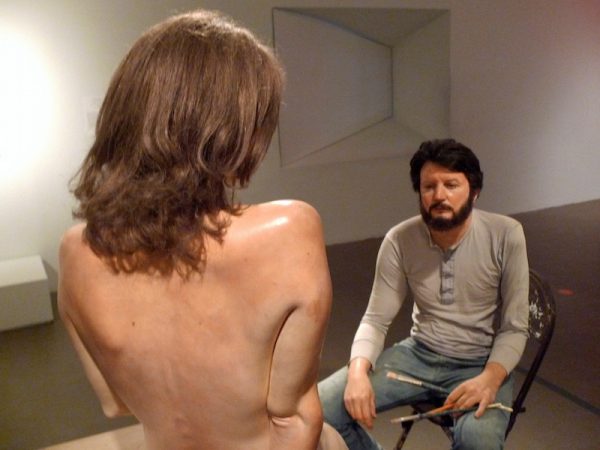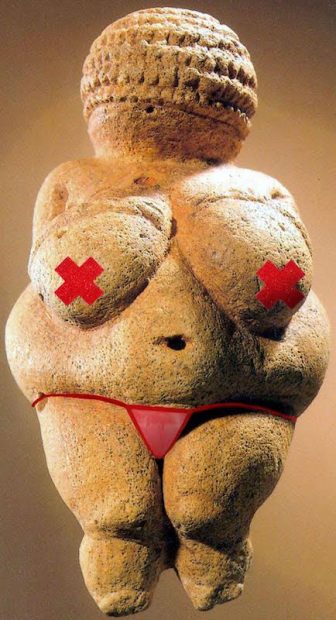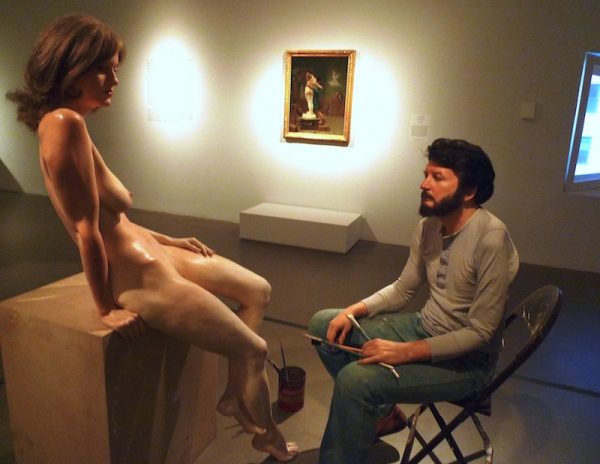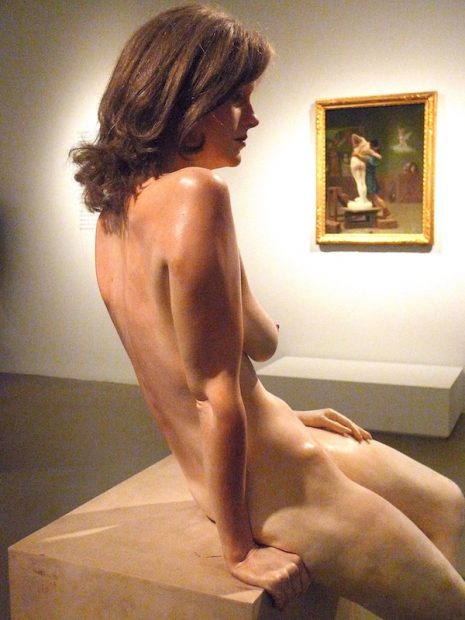[Update: Feb. 18, 2019, via this op-ed’s author: “On January 24 an Italian art historian named Ivano Mazzini began tagging posts I had made in November, which is how I found out that Facebook had reinstated my account. All of my photo albums were intact, and all the De Andrea photos had been uploaded (some of them twice), as if time had stood still since November 16, when I was ‘permanently deactivated.’ I wish I could say definitively whether Facebook does or does not aim to censor art in the future, but I am uncertain myself, since Facebook never sent me any communication on this matter. Nonetheless, I am relieved to have my account back, especially since I don’t know of any other instance in which a ‘permanently deactivated’ account was restored. I am very grateful to Glasstire, and to the many friends and journalists in various parts of the world who supported me, wrote about my case, made various interventions, and assisted in the recovery of my account. My profound thanks to all of you.”]
Facebook’s disabling of my account in November has led me to examine the history of Facebook’s censorship of art as reported in the press, which I share here in chronological order.
New York Academy of Art, original artworks (2011)
The New York Times reported that a drawing and other artworks were blocked by Facebook on the New York Academy of Art’s page. An Academy blog linked by the Times declares that Facebook should not be the “final arbiter and online curator” of its art. Comments on the blog detailed additional acts of censorship by Facebook. The Times noted an “unwritten Facebook policy” that permits nudity in paintings and sculptures. Facebook spokesperson Simon Axton, who pointed out that many Facebook employees are artists, was “thrilled” artists share their work on Facebook. Axton wrote that the Academy’s artwork had been blocked by mistake (“we congratulate the artist on his lifelike portrayal that, frankly, fooled our reviewers”) and added: “we encourage the artist to repost his work.” Axton concluded: “If we’re censoring, we’re doing a terrible job at it. We don’t censor art and have no intention to.” Metropolitan Museum of Art spokesperson Elyse Topalian reported that no art had been censored on Facebook.
Gustave Courbet’s Origin of the World, 1866 (2011-2018 and counting)
Danish sculptor Frode Steinicke posted Courbet’s Origin of the World in February of 2011 and Facebook deactivated his account. Many Facebook users utilized the painting as a profile picture in protest. Facebook restored Steinicke’s account without the Courbet.
French educator Frédéric Durand-Baïssas posted the Courbet painting a few days after Steinicke, and his account was deactivated. He sued Facebook in October of 2011. A French court ruling in 2016 kept the suit in France rather than California. The 2018 verdict faulted Facebook for summarily deactivating Durand-Baïssas’ account, but gave him no monetary award. It held that Durand-Baïssas did not prove why his account was deactivated, so he is appealing.
Durand-Baïssas’ account data could not be restored because such data is destroyed 90 days after deactivation. Facebook changed its written policy regarding nudity in art in 2015, and in 2018 Facebook spokesperson Delphine Reyre declared: “The Origin of the World is a painting that has a perfectly valid place on Facebook.”
Medieval manuscript illustrations and contemporary works, (2015)
The most prominent art personality to be suspended by Facebook for posting art images is the National Magazine Award and Pulitzer Prize Award-winning critic Jerry Saltz, who writes for New York Magazine. Saltz, who has an enormous following on Facebook, explains why he was twice suspended in 2015: “I did not run afoul of Facebook algorithms or morality… I ran afoul of art world people sending objections to Facebook about my ‘immoral imagery.’” This raises another censorship issue: anyone with a very large following can be punished for complaints that might not have merit.
Edvard Eriksen, The Little Mermaid, 1913, Copenhagen (2016)
Citing “too much bare skin or sexual undertones,” Facebook censored Mette Gjerskov, a Danish Member of Parliament, who attempted to post an image of the bronze statue that is the most photographed artwork in Denmark. Gjerskov’s appeal was successful.
Easter Simnel Cake, 2016, UK (2016)
A simnel cake baked by Fiona Moseley’s mother was topped by 12 round marzipan balls, representing Christ and his 11 disciples. Evidently misreading the balls (which have a dark center) as disembodied breasts, Instagram (owned by Facebook) not only blocked the cake, it disabled the baker’s account, presumably for the multiple offense of posting six pairs of female breasts! Don’t be surprised when the algorithm mistakes the sacred for the profane.
Did the algorithm mistake this cake for a mutant Diana of Ephesus? No. It only perceives patterns: the patterns of a nipple-licious cornucopia of forbidden social media fruit, a veritable breast pornado. This demonstrates why human moderators must oversee algorithms.
Nick Ut photograph, The Terror of War, 1972 (aka ‘Napalm Girl’) (2016)
Ut’s Pulitzer Prize-winning 1972 photograph features a nude fleeing girl who was the victim of a napalm attack in Vietnam. This controversy centered on the photograph’s status as a signal historical artifact, as reported by the Guardian. When Norwegian writer Tom Egeland used the photograph, the post was deleted and he was suspended from Facebook. Aftenposten, Norway’s largest newspaper, included the photograph in a story about Egeland’s suspension on its Facebook page. After they were deleted, Espen Egil Hansen, Aftenposten’s editor-in-chief, accused Facebook CEO Mark Zuckerberg of abusing his power by serving as a “master editor.” Hanson’s open letter also declared: “I am worried that the world’s most important medium is limiting freedom instead of trying to extend it, and that this occasionally happens in an authoritarian way.”
After the photograph was deleted from the Facebook account of Erna Solberg, the Norwegian prime minister, Solberg protested and Facebook reversed its position. Sheryl Sandberg, Facebook’s COO, informed Solberg in a letter: “…we don’t always get it right… Nonetheless, we intend to do better. We are committed to listening to our community and evolving. Thank you for helping us get this right.” Sandberg said two Facebook officials could meet with Solberg’s staff and added that she was “always available” for consultation. The Norway government’s investment in Facebook was valued at $1.54 billion in early 2016. Facebook can be moved, though it might take the application of enormous forces to achieve this end.
The initial decision to censor Ut’s photograph was made by Facebook employees, not the algorithm. Monika Bickert, head of policy at Facebook, who is responsible for what stays up and what is taken down, later concluded: “Context is everything.”
Caravaggio painting Amor Vincit Omnia (Love conquers all), 1602, Berlin, Gemäldegalerie, (2016)
When Facebook blocked an image of the Caravaggio that Milan-based art promoter Hamilton Moura Filho had posted to his page, he threatened to sue and told the newspaper La Repubblica: “This is an offense to history and culture.” Facebook apologized and unblocked his account. Filho thanked the art historians and museum directors who had supported him.
Giambologna, bronze statue of Neptune, 1560s, Bologna (2016)
Giambologna’s monumental statue is the symbol of the Italian city of Bologna, so Elisa Barbari used it to illustrate her Facebook page titled “Stories, curiosities and views of Bologna.” Technically, this was considered an advertisement, and Facebook has extremely stringent prohibitions governing ads, though it permits sculptures. Facebook’s message to Barbari included this passage from its advertising guidelines: “It presents an image with content that is explicitly sexual and which shows to an excessive degree the body, concentrating unnecessarily on body parts.” A Facebook spokesperson subsequently admitted: “This image does not violate our ad policies. We apologize for the error and have let the advertiser know we are approving their ad.”
Venus of Willendorf, c. 28,000–25,000 BC, Naturhistorisches Museum (NHM), Vienna (2017)
This Early Stone Age statuette is the best-known prehistoric statue in the world. When Italian graffiti writer Laura Ghianda posted an image of it, Facebook deleted it. Her four appeals were unsuccessful. NHM director Christian Koeberl, who noted that the museum had never received a complaint about the statue’s nudity, asked Facebook to reverse its blockage of this artwork, which it did. A Facebook spokesperson said Ghianda’s post had been mistaken for an ad, but that Facebook policies “have an exception for statues.” Consequently — even as an ad — the image should have been approved in the first place. Contrary to the above statement, The Art Newspaper says the Facebook advertisement for its story treating the censorship of the Venus of Willendorf was blocked on February 28 and never rescinded.
Additionally, Ghianda subsequently posted three photos of the statuette on her personal Facebook page that were not deleted. Hyperallergic reports that the NHM’s advertisements, including a recent “Valentine’s Day special with the Venus of Willendorf, animal sex, etc.” were never censored on Facebook. Clearly, this Venus’ reign on Facebook has been one of utter confusion, with inconsistent actions by both the algorithm and the human monitors.
Human Monitors: Heavy Workload and Human Error
As is evident in the above discussion, human error has played a critical role in Facebook censorship. In 2011, Simon Axton noted that each monitor examined thousands of cases each day. The NPR article linked above (re: Ut’s 1972 photograph) says they are mostly recent college graduates. It questions whether their training is adequate to assess something like the Ut photograph and concludes that the unit’s million-case weekly workload renders it “an editorial sweat shop.” These regulators also monitor hate speech. ProPublica says it showed Facebook 49 potentially offensive posts and Facebook admitted it got 22 of them wrong, so human error is a substantial factor in this area as well.
Wired reports that Facebook has 7,500 human content moderators for its 2.2 billion users. ProPublica notes that Facebook says it is doubling that number. But according to the short film The Cleaners Who Scrub Social Media (2018), tech companies now outsource most of the actual work to third parties in the developing world. The most disconcerting view comes from the full-length film called The Cleaners (2018). Filmmakers Moritz Riesewieck and Hans Bloc interview former content monitors in Manila. These moniters were expected to review 25,000 images per day, they were under enormous pressure to censor, and they do not seem to share the values of a democratic society.
John De Andrea, Self-Portrait with Sculpture, 1980 (2018)
My Facebook account was “permanently deactivated” on November 16 for uploaded images of the De Andrea sculpture. I had been temporarily blocked by Facebook two days earlier, but received an apology and the restoration of my account when I explained I was posting pictures of a sculpture. Consequently, I thought it was safe to upload additional shots. Facebook prohibits most photos of nude people, but permits nudity in art: “We also allow photographs of paintings, sculptures, and other art that depicts nude figures.” I made numerous attempts to make an appeal on my computer but only got error messages. I had the same experience on my Kindle, though one of those messages apparently got through to Facebook. I don’t understand why I was deactivated for posting pictures of a sculpture (which Facebook representatives have said is permitted since 2011) unless the algorithm and the moderator both mistook the statue for a real person.
These photos were part of my album dedicated to the landmark Like Life: Sculpture, Color, and the Body exhibition and were accompanied by links to reviews, the Met website, and albums of related exhibitions. The De Andrea is a signal work of its era. Because of conservation concerns, his sculptures are often in storage rather than on exhibition.
Its pairing with Jean-Léon Gérôme’s painting Pygmalion and Galatea was the most brilliant juxtaposition of the exhibition. Whereas Gérôme’s statue is brought to life by erotic desire, De Andrea’s is animated by the application of paint, the very act that is at the heart of the exhibition. The unpainted legs seemingly refer to those in the Gérôme painting.
I hope I can get my account back. Up until now, my experience on Facebook has been overwhelmingly positive. It enabled me to make connections with people all over the world. I posted hundreds of albums that I shared with scholars, artists, students, and the general public, who contributed their analysis and insights. I’d planned to use some for future publications, and I even have an important lecture that I crowd-sourced and wrote on Facebook. I would hate to think that nine years of work and the contacts I have made could be lost with the touch of a button.
Dr. Ruben Cordova is an art historian based in San Antonio.
Note: On Dec. 8, a friend of Dr. Cordova created a public Facebook page titled “Facebook Should Not Censor Art,” which includes some press accounts of Dr. Cordova’s ordeal (the story has been reported internationally). and invites people to relate any FB art censorship they’ve encountered. Find it here.








12 comments
Facebook should remedy this injustice. Art should be off limits from censorship.
It’s shocking that Facebook would take such Draconian measures and provide no appeals process!
I too was banned for posting a song from the Pixies’ “Surfer Rosa” album, whose cover art involves an exposed nipple. The problem, it seems to me, is not so much the ability of 7500 people to ‘clean’ the content generated by 2.2 billion users, but the absolute impenetrability of Facebook, the impossibility of interfacing with a human who has the authority and common sense to override the artless verdicts of the overworked cleaning crew. I see no justification for this. Amazon works with an equally large user base and its operations are a thousand times more complex, yet you can pick up the phone and speak directly with a service rep who has the authority and competence to solve your problem immediately. There’s no reason why Facebook can’t do the same.
Dr. Ruben Cordova is a recognized scholar of Art History. He has curated museum shows. He has followed the rules of Facebook which allow art to be shown. Facebook even apologized and restored his account after he first posted this artwork. De. Cordova’s thousand of listings from significant artworks all around the world have contributed greatly to the scholarly dialogue of art history through Facebook. His account should be restored so that he can continue his work through this medium. He has done nothing wrong. His banning from Facebook is incorrect, and it can only be interpreted as unjustified censorship.
I’ve been following fairly closely the tribulations of my friend and colleague Dr. Ruben Cordova in the face of his fight with Facebook. Ironically his battle coincides with my celebration of similar fights—some nearly thirty years ago also on a national stage: I have these past few months been preparing for mailing to New York University’s Fales Library where they will be archived in the Downtown Collection ten boxes of personal and professional papers and ephemera from the ‘eighties and early ‘nineties when I lived and worked in Washington, DC as assistant and associate director of the National Association of Artists’ Organizations (NAAO) , a short stint at the National Endowment for the Arts as the ire in Congress over Mapplethorpe and Serrano was just beginning to sear, and my time as an itinerant performer in Lower Manhattan during those dizzying times.
Recently too, I have organized and had approved a panel discussion for the April 25-28, 2019 Common Field Convening in Philadelphia . Common Field is a direct descendant of NAAO, developing as a service organization for artists and artist-run spaces. Common Field is increasingly interested in its history largely rooted in NAAO and the NAAO-developed NCFE, National Campaign for Freedom of Expression. The panel I’ve prepared and will conduct will consist also of Charlotte R. Murphy, executive director of NAAO during the crucial years of controversy over federal arts funding and First Amendment rights; Joy Silverman, an artist space pioneer and first director of NCFE; and Al Nodal, artist space pioneer instrumental in the formation of NAAO who served as General Manager of the City of Los Angeles’ Cultural Affairs Department from 1988-2001.
This is all to say that the climate is proving ripe for examination of systemic arts censorship such as the one that artist/scholar Dr. Cordova is embroiled in as he attempts to re-gain data, text, research and imagery lost on his usurped Facebook account. These discussions are especially crucially in this divided and increasingly divisive digital age.
Common Field is conducting a meet-up in Houston on January 22, 2019 . Go if you can. Join the conversation. Very little can be more vital than artists organizing .
Penelope Boyer, PhD
San Antonio, TX
Since my post did not appear immediately, may I add one more sentence?
Please have the penultimate paragraph read:
This is all to say that the climate is proving ripe for examination of systemic arts censorship such as the one that artist/scholar Dr. Cordova is embroiled in as he attempts to re-gain data, text, research and imagery lost on his usurped Facebook account. These discussions are especially crucially in this divided and increasingly divisive digital age. This spring I will train to become a certified Wiki Scholar . Hopefully that platform will maintain its rigorous research and standards of veracity resisting like a plague the draconian decisions Facebook makes.
Dr. Cordova’s extensive FB archive of photo albums is perhaps the definitive collection of fine art images on FB. It is an essential resource consisting of tens of thousands of photographs of artworks from museums around the world. The photographs were taken over decades of travels by Dr. Cordova and documents the most important paintings and sculptures in art history. Covering everything from Asian antiquities to European masterworks, from decorative arts to Aztec sculpture, from traditional African art to exhibitions of contemporary art mounted at the world’s most illustrious institutions, Dr. Cordova’s FB document is an absolutely unparalleled art research resource on social media.
Cordova is widely followed and his FB friends list is comprised of thousands of the most important artists, scholars and theorists in the world who regularly avail themselves of this research collection. The deactivation of Dr. Cordova’s FB account is more than an injustice and a personal tragedy for him, costing him thousands of hours of effort in curating and posting, as well as hamstringing his ongoing research, publishing and curatorial projects. This unwarranted censorship is an assault on art scholarship and research that will handicap thousands of artists and scholars who value the community service Dr. Cordova provides. This misfire by FB is creating copious collateral damage to countless people.
If Dr. Cordova could pull a few million dollars in stock out of FB’s liquidity then perhaps he could get Zuckerberg’s attention and a reasonable response from FB. But this should not be necessary for FB to honor the terms of its own contract to provide service and FB should not be allowed to unilaterally and arbitrarily adjudicate its own policies without a reasonable process of appeal or providing plausible justification rather than unfounded indictment and deactivation without practical recourse. FB needs to immediately correct this egregious error and restore Dr. Cordova’s valuable intellectual property to him through reactivating his FB account.
I guess people forget that our civilization is based on Greco Romano culture that was not uptight about nudity. On the contrary they compared the human body with the gods. Get over it the body is beautiful.
It is a question of social network entrepreneurs entering into the fray of freedom of speech and censorship. With such a global reach, FB is clearly a component of an emerging utility, somewhat like US Mail, but with the power to open letters to make sure the contents meet acceptable qualities (not qualities of dangerousness like bombs or dusts, but subversiveness like messaging or persuasiveness). Like past questions of censorship in the arts, this particular issue represents a test of the First Amendment, but not as a moment to regulate content (free speech); but as a moment to define the limitations of a new player; the profit seeking entrepreneurs in the activities of the public using quasi-open source free-services that trade free-use for the sale of private-usage algorithms.
Recently former FB developers have come out publicly to denounce the manipulativeness of the FB theory, which is really a red-herring concern. The real concern lies in the busting of the bubbles that controlled information in the mass media age; a bursting causing events like the Arab Spring. Ruben Cordoba and others are being victimized by the free-speech roll-back as governments enter the control phase of global communication, estimating that roll-backs typically roll back beyond their former limits.
Artists, curators and critics do not have extra-right to free speech but they play a vital role in defining and expanding free speech. The actions of FB in this particular dilemma gives rise to serious concern as its actions make apparent systemic propaganda globally as well as in the United States. FB’s actions work against the quiet voice amid the emerging roar of global control.
Dr. Cordova has provided consistent comment and critique of all phases of fine art in both history and the modern world. His expertise is impeccable and he is very careful to keep relevance and professionalism in everything he does. The recent confrontation with Facebook is an example of how something that was meant to be a positive force in our world has turned onto itself (and us) to devour our dignity. Delegating the “censorship” of thousands of images and content per day to a 3rd world country worker who has not been to art school or grown up in America is just an example of HOW this scenario can happen… not to mention a fool at the helm of one of the most powerful countries in the world with his finger on the nuclear trigger. In the art world, it is the same scene. Facebook should restore Dr. Cordova’s account and then we could continue to enjoy his knowledge and insight. I know a lot about the art business and the history as well, and I always learn something new from him. I need another drink of water from Dr. Cordova’s well, turn the faucet back ON!
Non ho mai conosciuto una persona con la generosità ,competenza e gentilezza pari al DR Ruben Cordova . Ha messo a disposizione di tutti gli amici senza distinzione di nazionalità o religione un numro enorme di fotografie da lui realizzate. Comprendo la difficoltà di gestire il controllo da parte di Facebbok ,ma in questo caso non era possibile compiere un derrore,se non volontariamente. Tutto è stato fatto alla luce del sole ed in nome dell’amore per l’arte e la cultura e il DR Ruben Cordova deve essere pienamente riabilitato . Cordiali Saluti di buon lavoro .
I have never met a person with the generosity, competence and kindness of DR Ruben Cordova. He made available to all friends without distinction of nationality or religion a huge number of photographs made by him. I understand the difficulty of managing the control by Facebook, but in this case it was not possible to make a mistake, if not voluntarily. Everything has been done in the light of the sun and in the name of love for art and culture and DR Ruben Cordova must be fully rehabilitated. Best regards, good work